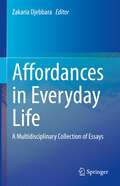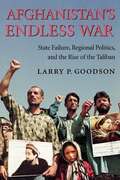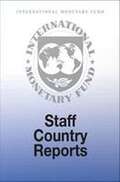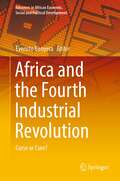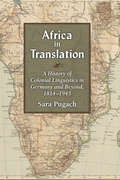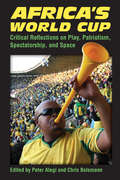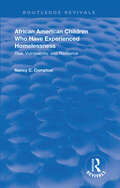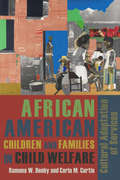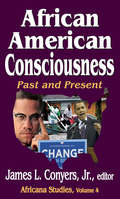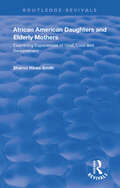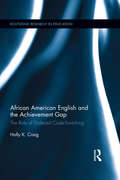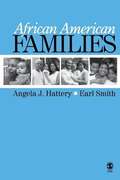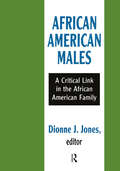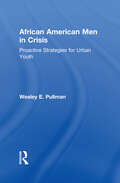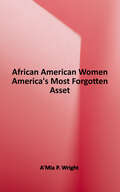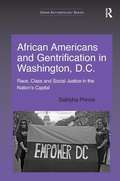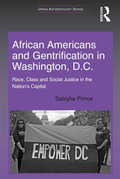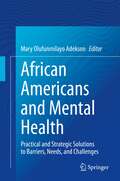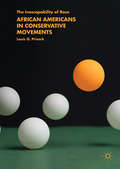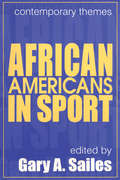- Table View
- List View
Affordances in Everyday Life: A Multidisciplinary Collection of Essays
by Zakaria DjebbaraThe concept of affordances is being increasingly used in fields beyond ecological psychology to reveal previously unexplored interdisciplinary relationships. These fields include engineering, robotics, artificial intelligence, neuroscience, urban theory, architecture, computer science, and much more. As the concept is adapted for its relational meaning between an agent and the environment, or object, the meaning of the term has changed to fit the customs of the adapting field. This book maps the different shades of the term and brings insights into how it is operationalized by providing short accessible essays regardless of background. Each contribution addresses big questions around this topic such as the application of the concept on ongoing research, how to measure or identify affordances, as well as other reflective questions about the future of affordances in the field. The book is envisioned to be read by non-experts, students, and researchers from several disciplines, and fills the need for summarization across disciplines. As the many adaptations flourished from the same psychological concept, this book also aims to function as a catalyst and motivation for reinterpreting the concepts for new directions. Compared to existing books, this book aims not to span the vertical dimension of field by taking a deep dive into a niche-field—instead, this book aims to have a wide horizontal span highlighting a common concept shared by an increasing number of fields, namely affordances. As such, this book takes a different approach by attempting to summarize the different emerging applications and definitions of the concept, and make them accessible to non-experts, students, and researchers regardless of background and level.
Afghanistan Remembers
by Parin DossaAlthough extensive literature exists on the violence of war, little attention has been given to the ways in which this violence becomes entrenched and normalized in the inner recesses of everyday life. In Afghanistan Remembers, Parin Dossa examines Afghan women's recall of violence through memories and food practices in their homeland and its diaspora. Her work reveals how the suffering and trauma of violence has been rendered socially invisible following decades of life in a war-zone.Dossa argues that it is necessary to acknowledge the impact of violence on the familial lives of Afghan women along with their attempts at recovery under difficult circumstances. Informed by Dossa's own story of family migration and loss, Afghanistan Remembers is a poignant ethnographic account of the trauma of war. She calls on the reader to recognize and bear witness to the impact of deeper forms of violence.
Afghanistan's Endless War: State Failure, Regional Politics, and the Rise of the Taliban
by Larry E. GoodsonState Failure, Regional Politics, and the rise of the Taliban
Africa and the Fourth Industrial Revolution: Curse or Cure? (Advances in African Economic, Social and Political Development)
by Everisto BenyeraThis book examines the epistemological, political, and socio-economic consequences of the Fourth Industrial Revolution (4IR) for Africa. Presenting various case studies on epistemic freedom, theology, race and robotics, tertiary education, political and economic transformation, human capital, and governance, it debates whether the 4IR will be part of the solution to the African problem, namely that of coloniality in its various forms. Solving the African problem using the 4IR requires ethical, just and epistemologically independent leadership. However, the lack of ICT infrastructure militates against Africa’s endeavours to make the 4IR a problem-solving moment. To its credit, Africa possesses some of the major capital needed (human, mineral, and social), and it constitutes a huge market comprising a young population eager to participate in the 4IR as problem-solvers and not as a problem to be solved—as equal citizens and not as the marginalized other.
Africa in Translation: A History of Colonial Linguistics in Germany and Beyond, 1814-1945
by Sara Pugach"Africa in Translationis a thoughtful contribution to the literature on colonialism and culture in Germany and will find readers in the fields of German history and German studies as well as appealing to audiences in the large and interdisciplinary fields of colonialism and postcolonialism. " ---Jennifer Jenkins, University of Toronto The study of African languages in Germany, or Afrikanistik, originated among Protestant missionaries in the early nineteenth century and was incorporated into German universities after Germany entered the "Scramble for Africa" and became a colonial power in the 1880s. Despite its long history, few know about the German literature on African languages or the prominence of Germans in the discipline of African philology. InAfrica in Translation: A History of Colonial Linguistics in Germany and Beyond, 1814--1945, Sara Pugach works to fill this gap, arguing that Afrikanistik was essential to the construction of racialist knowledge in Germany. While in other countries biological explanations of African difference were central to African studies, the German approach was essentially linguistic, linking language to culture and national identity. Pugach traces this linguistic focus back to the missionaries' belief that conversion could not occur unless the "Word" was allowed to touch a person's heart in his or her native language, as well as to the connection between German missionaries living in Africa and armchair linguists in places like Berlin and Hamburg. Over the years, this resulted in Afrikanistik scholars using language and culture rather than biology to categorize African ethnic and racial groups. Africa in Translationfollows the history of Afrikanistik from its roots in the missionaries' practical linguistic concerns to its development as an academic subject in both Germany and South Africa throughout the nineteenth and twentieth centuries. Sara Pugach is Assistant Professor of History at California State University, Los Angeles. Jacket image: Perthes, Justus. Mittel und Süd-Afrika. Map. Courtesy of the University of Michigan's Stephen S. Clark Library map collection.
Africa's World Cup: Critical Reflections on Play, Patriotism, Spectatorship, and Space
by Peter Chris Alegi BolsmannAfrica s World Cup: Critical Reflections on Play, Patriotism, Spectatorship, and Space focuses on a remarkable month in the modern history of Africa and in the global history of football. Peter Alegi and Chris Bolsmann are well-known experts on South African football, and they have assembled an impressive team of local and international journalists, academics, and football experts to reflect on the 2010 World Cup and its broader significance, its meanings, complexities, and contradictions. The World Cup s sounds, sights, and aesthetics are explored, along with questions of patriotism, nationalism, and spectatorship in Africa and around the world. Experts on urban design and communities write on how the presence of the World Cup worked to refashion urban spaces and negotiate the local struggles in the hosting cities. The volume is richly illustrated by authors photographs, and the essays in this volume feature chronicles of match day experiences; travelogues; ethnographies of fan cultures; analyses of print, broadcast, and electronic media coverage of the tournament; reflections on the World Cup s private and public spaces; football exhibits in South African museums; and critiques of the World Cup s processes of inclusion and exclusion, as well as its political and economic legacies. The volume concludes with a forum on the World Cup, including Thabo Dladla, Director of Soccer at the University of KwaZulu-Natal, Mohlomi Kekeletso Maubane, a well-known Soweto-based writer and a soccer researcher, and Rodney Reiners, former professional footballer and current chief soccer writer for the Cape Argus newspaper in Cape Town. This collection will appeal to students, scholars, journalists, and fans. Cover illustration: South African fan blowing his vuvuzela at South Africa vs. France, Free State Stadium, Bloemfontein, June 22, 2010. Photo by Chris Bolsmann. "
African American Children Who Have Experienced Homelessness: Risk, Vulnerability, and Resilience
by Nancy C. ComptonFirst published in 1998. While there are ever-increasing numbers of families with young children becoming homeless, little is known about interventions which can promote homeless childrens’ resiliency. This study identifies factors that contribute to homeless children’s positive outcomes. Seventeen African-American children and their mothers were identified through an agency that serves high-risk homeless families. The children were between the ages of three and six-and-a-half.
African American Children and Families in Child Welfare
by Ramona Denby Carla M. CurtisThis text proposes corrective action to improve the institutional care of African American children and their families, calling attention to the specific needs of this population and the historical, social, and political factors that have shaped its experience within the child welfare system. The authors critique policy and research and suggest culturally targeted program and policy responses for more positive outcomes.
African American Children and Families in Child Welfare: Cultural Adaptation of Services
by Ramona Denby Carla CurtisThis text proposes corrective action to improve the institutional care of African American children and their families, calling attention to the specific needs of this population and the historical, social, and political factors that have shaped its experience within the child welfare system. The authors critique policy and research and suggest culturally targeted program and policy responses for more positive outcomes.
African American Community Practice Models: Historical and Contemporary Responses
by Iris Carlton-Laney N Yolanda BurwellAfrican American Community Practice Models shows you what you can “see” and “learn” when people of African American descent are put in the center of community analysis and change. This text celebrates African American experiences and challenges you to understand the black experience from the inside out rather than from the outside in. The contributors provide excellent historical and current case studies of leaders and programs that provide you with models for program and community development in African American communities today. For the contemporary social worker, these historical comparisons reveal what strategies have been needed in African American communities in the past because of political and social climates. The studies of current successful programs instruct those in community-based African American programs, general service networks, and students on how to continue to better serve the black community.The contributing authors use a new lens for understanding social welfare history and social service development. They encourage social workers to explore new model-building and to pursue new knowledge about African Americans in the social work classroom. In addition to tracing the history of community development, African American Community Practice Models specifically: presents the black community from a position of strength and leadership documents leadership in the black community to ground national advocacy organizations traces women’s leadership in community development documents the unrecognized history of African Americans in the development of the Settlement Movement highlights examples of current self-help programs sponsored by African American communities to change negative behavior patterns documents the impact of racism on service delivery and the response to develop community support programs presents a challenge to expand community development for both internal and external advocacyProfessors of the core courses in social work--HBSE, research, policy, and practice--and of specialized courses in community practice, macropractice, and African Americans would benefit from teaching from African American Community Practice Models. Students and faculty in these and other study areas concerned with this community will get community tactics and program development ideas from this book that connect with African American people. The importance of community development from within the African American community, historical and current methods of dealing with the ongoing impact of racism and economic disadvantage, the responsibility of professionals and community leaders to build empowerment strategies within African American communities, and the need to advocate for rights and opportunities in larger society for black Americans are key issues addressed throughout the book, which begins to fill the void of positive presentations of black community development.
African American Consciousness: Past and Present (Africana Studies)
by Jr. ConyersAfrican American Consciousness focuses on ideas of culture, race, and class within the interdisciplinary matrix of Africana Studies. Even more important, it uses a methodology that emphasizes interpretation and the necessity of interdisciplinary research and writing in a global society. Worldview, culture, analytic thinking, and historiography can all be used as tools of analysis, and in the process of discovery, use pedagogy, and survey research of Africana history. Advancing the idea of Africana Studies, mixed methodology, and triangulation, the contributors provide alternative approaches toward examining this phenomena, with regard to place, space, and time.The essays in this volume include Reynaldo Anderson, "Black History dot.com" Greg Carr, "Black Consciousness, Pan-Africanism and the African World History Project" Karanja Carroll, "A Genealogical Review of the Worldview Concept and Framework in Africana Studies" Denise Martin, "Reflections on African Celestial Culture" Serie McDougal "Teaching Black Males" Demetrius Pearson, "Cowboys of Color" Pamela Reed, "Heirs to Disparity" and Andrew Smallwood, "Malcolm X's Leadership and Legacy."The researchers in this volume investigate, explore, and review patterns of functional, normative, and expressive behavior. The past and present of Africana culture is represented, showing how reflexivity can be an adjustable concept to organize, process, and interpret data. Moreover, humanism and social science demonstrate how researchers establish, extract, and identify the limitations and alternative approaches to research of the historic conditions of black Americans.
African American Daughters and Elderly Mothers
by Sharon Hines SmithFirst published in 1998. The death of an elderly person— and its impact on an adult child—is considered so "normal" that it has attracted scant attention. This study attempts to fill that gap by examining a specific slice of a specific ethnic group and looking at the meaning of elderly mothers’ deaths for their adult, African American daughters— from the perspective of those daughters.
African American English and the Achievement Gap: The Role of Dialectal Code Switching (Routledge Research in Education)
by Holly K. CraigMany African American children make use of African American English (AAE) in their everyday lives, and face academic barriers when introduced to Standard American English (SAE) in the classroom. Research has shown that students who can adapt and use SAE for academic purposes demonstrate significantly better test scores than their less adaptable peers. Accordingly, AAE use and its confirmed inverse relationship to reading achievement have been implicated in the Black-White Test Score Gap, thus becoming the focus of intense research and practical interest. This volume discusses dialectal code-switching from AAE to SAE and stresses the benefits and importance of African American students becoming bi-dialectal. It provides background theory and science supporting the most promising educational approach to date, Contrastive Analysis, a set of longstanding methods drawn from Second Language research and used effectively with students ranging from kindergarten through college. It offers a deeper knowledge of AAE use by students, the critical features of Contrastive Analysis, and detailed information about successful applications which teachers can apply in their own pedagogy.
African American Families
by Earl Smith Angela J. HatteryThis book provides students with a systematic sociological study of contemporary life for families of African descent living in the United States. Because it deals with issues facing African American families, it covers ground that is often considered, such as marriage and fertility rates, non-marital births, age at first birth, etc. , but the authors also deal with several issues slighted or ignored in texts about African American family life, including disproportionately high rates of incarceration, family violence, and chronic diseases such as HIV/AIDS. Also departing from previous books, the authors examine ways in which individual choice (e. g. , choosing to use drugs, choosing to engage in unprotected sex, choosing to drop out of school) intersects with the larger societal factors and constraints. All these indices are woven together and cry out foráa new look at African American family situations that this book will provide. The authors hope to capture the complexities and nuances of a web of factors, thereby helping students explore both structural and individual explanations for problems facing many African American families today.
African American Males: A Critical Link in the African American Family
by Dionne J. JonesAfrican American families have demonstrated their strengths and survival skills through many generations, from slavery to the present time. As the African American middle class has grown over the last two decades, so have their numbers among elected officials and in business. Despite this, African Americans are experiencing extreme stress, but African American males appear to suffer the most. The disproportionate share of African American male inmates in the United States, the high homicidal rate, the astronomical rise and spread of the AIDS virus, and the continuing growth of drug abuse, all suggest that the African American male may be becoming an endangered species. In order to save the African American family. the structural and environmental conditions that give rise to these negative conditions must be studied. The chapters in this volume address some of the pressing issues affecting African American men. Chapters and contributors include: "Reaffirming Young African American Males: Mentoring and Community Involvement by Fraternities and Other Groups" by Dionne J. Jones. Victor E. Bibbins, and Ronald D. Henderson; "Health Status of African American Men" by Lawrence E. Gary; "Urban Adolescent Homicidal Violence: An Emerging Public Health Concern" by Ronald K. Barrett; and "Pastoral Counseling with African American Men" by Edward P. Wimberly. African American Males affirms that this segment of the population is a precious resource, and as such, they must be nurtured throughout their lives. The current situation makes for structural unbalance in American society as a whole, no less than within African American communities as such. This book will be of interest to sociologists, psychologists, and black studies specialists.
African American Men in Crisis: Proactive Strategies for Urban Youth (Children of Poverty)
by Wesley E. PullmanFirst published in 1995. Routledge is an imprint of Taylor & Francis, an informa company.
African American Pioneers of Sociology
by Peter Feldstein Pierre Saint-ArnaudIn African American Pioneers of Sociology, Pierre Saint-Arnaud examines the lasting contributions that African Americans have made to the field of sociology. Arguing that science is anything but a neutral construct, he defends the radical stances taken by early African American sociologists from accusations of intellectual infirmity by foregrounding the racist historical context of the time these influential works were produced. Examining key figures such as W.E.B. Du Bois, Edward Franklin Frazier, Charles Spurgeon Johnson, Horace Roscoe Cayton, J.G. St. Clair Drake, and Oliver Cromwell Cox, Saint-Arnaudreveals the ways in which many aspects of modern sociology emerged from these authors' radical views on race, gender, religion, and class. Beautifully translated from its original French, African American Pioneers of Sociology is a stunning examination of the influence of African American intellectuals and an essential work for understanding the origins of sociology as a modern discipline.
African American Women: America's Most Forgotten Asset
by A'Mia P. WrightWithin this book, the author aimed to restore, rehabilitate, and mend African-American Women and the community. The entire world has acknowledged the issues African Americans face as a culture, however, no one has advanced toward assimilating relationships within the culture. As resilient of a people as African Americans are the culture still need a leader, still need guidance, and still need reassurance. It is believed that African-American Women are the key to turning everything around and remodeling the foundation that was once laid. The potency of African-American Women is so prodigious that it has the power of an atomic bomb. Today's leaders for African Americans are outnumbered and rejected because in the community today, stupidity reigns over knowledge and foolishness is the new cute.
African Americans and Gentrification in Washington, D.C.
by Sabiyha PrinceUsing qualitative data, including extensive interview material and ethnographic research, to explore the experiences and ideas of African Americans as they confront and construct gentrification, this book contextualizes black Washingtonians' perspectives on belonging and attachment during a marked period of urban restructuring and demographic change in the nation's capital.
African Americans and Gentrification in Washington, D.C.: Race, Class and Social Justice in the Nation’s Capital (Urban Anthropology)
by Sabiyha PrinceThis book uses qualitative data to explore the experiences and ideas of African Americans confronting and constructing gentrification in Washington, D.C. It contextualizes Black Washingtonians’ perspectives on belonging and attachment during a marked period of urban restructuring and demographic change in the Nation’s Capital and sheds light on the process of social hierarchies and standpoints unfolding over time. African Americans and Gentrification in Washington, D.C. emerges as a portrait of a heterogeneous African American population wherein members define their identity and culture as a people informed by the impact of injustice on the urban landscape. It presents oral history and ethnographic data on current and former African American residents of D.C. and combines these findings with analyses from institutional, statistical, and scholarly reports on wealth inequality, shortages in affordable housing, and rates of unemployment. Prince contends that gentrification seizes upon and fosters uneven development, vulnerability and alienation and contributes to classed and racialized tensions in affected communities in a book that will interest social scientists working in the fields of critical urban studies and urban ethnography. African Americans and Gentrification in Washington, D.C. will also invigorate discussions of neoliberalism, critical whiteness studies and race relations in the 21st Century.
African Americans and Mental Health: Practical and Strategic Solutions to Barriers, Needs, and Challenges
by Mary Olufunmilayo AdeksonThis book enumerates the unique challenges, barriers, needs, and trauma of being an African American in the United States, and at the same time highlights what needs to be done to improve and foster the mental health healing of this population. This includes practical applications and strategic solutions that work, such as the family togetherness and ardent spiritual beliefs that form the basis for resilient and vibrant mental health among African Americans. This contributed volume features the authorship of counseling professionals, most of whom are African American themselves. Because of their own personal experiences, they are able to emphasize cogent helping strategies for this population, to show how to move forward with encouragement. The book also highlights ways to promote life that is mentally healthy and holistic for African Americans.Topics covered within the chapters include:Mental Health Challenges Unique to African American Children and AdolescentsDiagnosis Issues with African Americans Culture of Family Togetherness, Emotional Resilience, and Spiritual Lifestyles Inherent in African Americans from the Time of Slavery Until Now The Trauma of Being an African American in the 21st Century Training, Recruiting, and Retaining African American Mental Health ProfessionalsAfrican Americans and Mental Health: Practical and Strategic Solutions to Barriers, Needs, and Challenges is an essential resource for helping professionals who work with this population, including psychiatrists, counselors, psychologists, social workers, and other mental health professionals. The book also should be of interest to researchers, instructors, and students in Counseling, Social Work, and Psychology.
African Americans in Conservative Movements: The Inescapability of Race
by Louis G. PrisockReveals the limitations of the “one-size fits all” perspective commonly used in conversations about African American conservatives.<P><P> Unwinds the complexities of black conservative relationships to the wider conservative movement and American society as large.<P> Explores what the Right and the African American conservative can do to avoid suspicions of “tokenism”.<P>Providing an expansive view of the making and meaning of African American conservatism, this volume examines the phenomenon in four spheres: the political realm, the academic world, the black church, and grass-roots activism movements. In his analysis of their activities in these realms, Louis Prisock examines the challenges African American conservatives face as they operate within the context of (largely white) conservatism. At the same time that African American conservatives challenge the white conservative movement’s principle of “color blindness,” they are accused of being “racial mascots,” or “tokens” from those outside of it. Prisock unwinds the intricacies of black conservatives’ relationships to both the wider conservative movement and the everyday life experiences of black Americans, showing that they are as vulnerable to the “inescability of race” as any other individual in a racialized America
African Americans in Sports
by Gary A. SailesResearch on African American athletes generally fo-cuses on negative stereotypes of physical prowess, and socially controversial themes. Most studies in-vestigate racism, prejudice, discrimination, and ex-ploitation experienced by African American athletes. Many studies contrast African American and white athletes on a number of variables that support pre-vailing elitist stereotypes and denigrate African Ameri-can athletes. But few studies investigate the diverse and complex cultural dichotomies within the infrastruc-ture of sport in the African American community. Gary Sailes maintains that it is crucial to develop a more eclectic and immersed cultural approach when investigating African American involvement in com-petitive sports. The contributors to 'African Americans in Sports' show that there are also intrinsic cultural paradigms that are evident, presenting an informa-tive and interesting narrative regarding African American athletes. The chapters that make up this volume were written by noted scholars who were selected based on their expertise in their specific academic areas. They write about different components of the experience of African American male athletes. Chapters and contributors include: "Race and Athletic Performance: A Physiological Review" by David W. Hunter; "The Athletic Dominance of African Americans--Is There a Genetic Basis?" by Vinay Harpalani; "African American Player Codes on Celebration, Taunting, and Sportsmanlike Conduct" by Vernon L. Andrews; and "Stacking in Major League Baseball" by Earl Smith and C. Keith Harrison. Many chapters were originally published as a special issue of the 'Journal of African American Men.' This volume should be read by all those involved in athletics, as well as by sports sociologists and African American studies scholars.
African Calliope: A Journey to the Sudan
by Edward Coolbaugh HoaglandFollow Hoagland's travels, from equatorial mountain forests to the Sahara desert; from small Sudanese towns in the south and west to short stays in the capital, Khartoum. Hoagland's eye for detail presents the reader with electrifying images of life in the Sudan - rotten diets, disease, coups and civil war, the traders, poachers, tribal headmen, and those who come to help.
